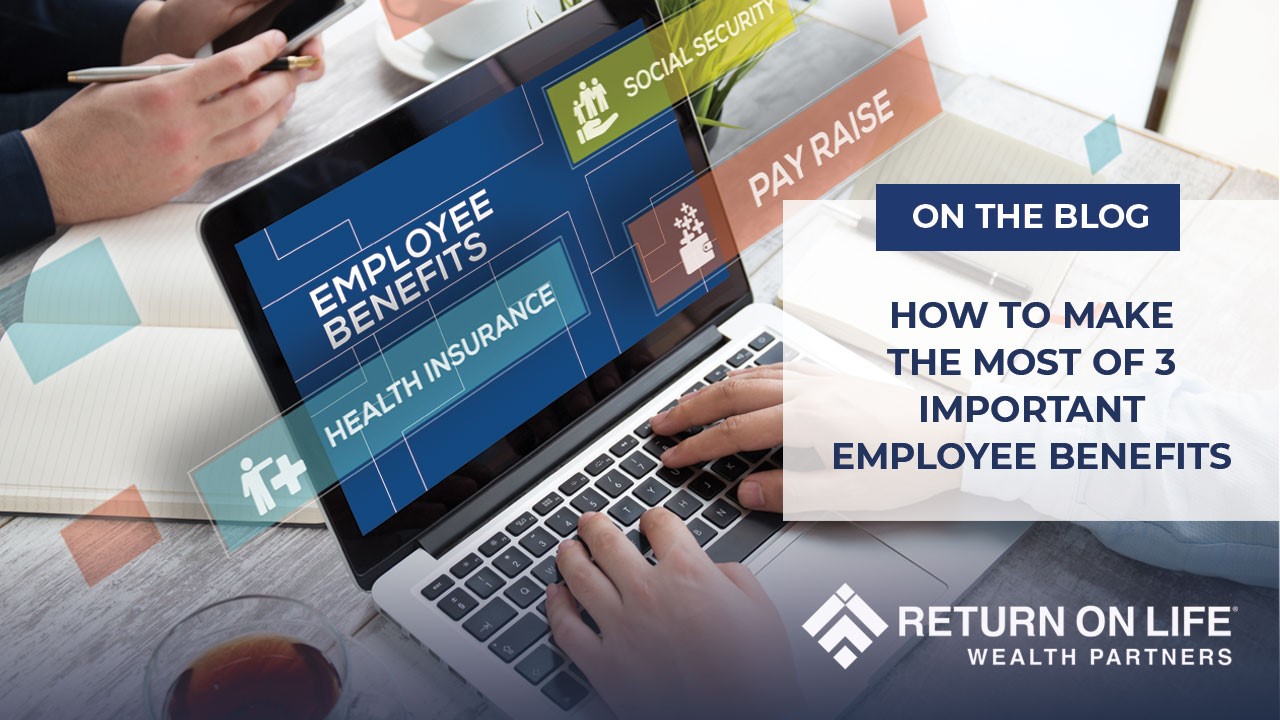Understanding your workplace benefits
Return on Life Wealth Partners, we believe that true wealth is far more than a number on a page. It’s about implementing strategies that seek to grow your wealth while helping to protect your income and assets. Employee benefits can play a significant role in helping to accomplish these goals throughout your working years. Below, we examine how three workplace benefits can help you and your family pursue your wealth building and asset protection goals.
1. Prioritize your savings
We believe that employer-sponsored retirement plans are a centerpiece of employee benefits. In fact, participating in your employer retirement plan may have the ability to provide one of the most efficient and effective ways to move closer to your long-term financial goals. Pre-tax contributions to qualified plans, such as 401(k) or 403(b) plans, help reduce your current taxable income and enable account earnings to compound and grow on a tax-deferred basis. Based on IRS rules, individuals don’t pay taxes until assets are withdrawn, typically in retirement. (Keep in mind, withdrawals made prior to age 59 ½ may be subject to taxes and penalties if they fall outside of certain exceptions.)
In general, most comprehensive employee benefits programs offer the ability to make Roth retirement plan contributions. While Roth retirement contributions are made on an after-tax basis, plan participants still benefit from tax-exempt compounding, which has the ability to allow potential earnings to grow at a faster rate than some alternatives. Employer retirement plans also offer a broad range of investment choices that may include model and target-date portfolios and automated features like annual deferral increases that make it easy to save more over time.
In 2024, you can contribute up to $23,000 to your employer plan. And if you’re age 50 or older, you can make an additional $7,500 catch-up contribution, for a total maximum contribution of $30,500. If you’re not able to contribute the maximum allowable amount, we note that contributing at match level or above, if your employer offers one, is recommended.
2. Protect your dependents
We believe life insurance available through an employer can be a cost-effective way to help protect those who will depend on your income in the event of your death. As an employee benefit, life insurance is usually provided through a group term policy at no cost or low cost to eligible employees. Coverage may also be available at a reasonable cost for your spouse or dependent family members. In many cases, you may be able to purchase additional levels of coverage, which may be subject to a medical exam and/or other requirements.
Keep in mind that employer-provided life insurance policies typically terminate when you leave your current employer. However, some group policies provided as an employee benefit may be "portable," allowing you to pay for the same coverage after you leave your job. While group life insurance can be affordable and easy to qualify for, privately owned life insurance offers more flexibility and customization as well as the ability to keep coverage no matter where you choose to work.
3. Safeguard your income
Another employee benefit that can be critical for protecting your income is disability insurance. Disability insurance available through your employer can help mitigate a loss of income during your working years due to an illness or accident that leads to a short- or long-term disability. It’s important to note that disability insurance policies generally replace between 45% and 65% of your gross income.
Some employee benefits programs pay the full cost of disability insurance on behalf of employees. Others may offer disability insurance at a discounted group rate or as a voluntary benefit that you can elect and pay for yourself. Like group life insurance, disability insurance is often easier to qualify for and less expensive when purchased through your employer. In certain cases, this employee benefit may also be portable, allowing you to pay to continue your coverage if you separate from your employer.
Review your employee benefit elections annually
It’s important to review your employee benefits elections at least annually as your life and your financial needs evolve. Your employer may also make changes and enhancements to your healthcare and retirement plans, as well as other benefits from one year to the next.
Typically, you’re only able to update your employee benefit elections when you join a new employer or during your employer’s annual open enrollment period, which occurs in the fall for most employers. However, certain life events may trigger an exception like a change in your marital status, number of dependents, or in certain cases, a change in your employment status, such as moving from part-time to full-time work or from an hourly to a salaried position. In most cases, once you’re eligible to participate in your employer’s retirement plan, you can join the plan at any time during the calendar year.
To learn more about making smart choices regarding your employee benefits, listen to our latest podcast episode of Frank Wealth Insights. To learn how your team of independent wealth planning professionals at Return on Life® Wealth Partners can help you and your family pursue the Return on Life® you desire, contact us today for a free consultation.
About Return on Life® Wealth Partners
Return on Life Wealth Partners is an independent Registered Investment Advisor (RIA) founded in 1994, with headquarters in Cleveland. The team provides comprehensive wealth planning services to individuals, families, and business owners. By examining clients’ lives before their money, Return on Life® aligns its advice with clients’ values. This personalized approach also extends to the institutional and corporate retirement plan services available through 401(k) Prosperity®.
The opinions expressed and material provided are for general information purposes only.
This information is not intended to be a substitute for individualized insurance, tax, or legal advice. We suggest that you discuss your specific issues with a qualified advisor.
Securities and Retirement Plan Consulting Program advisory services offered through LPL Financial, a Registered Investment Advisor, member FINRA/SIPC.
Investment advice offered through Planned Financial Services, LLC, a Registered Investment Advisor and separate entity from LPL Financial. For additional information related to our services, please visit https://adviserinfo.sec.gov/firm/summary/112879.
Copyright © 2024 Planned Financial Services, LLC. All Rights Reserved.









